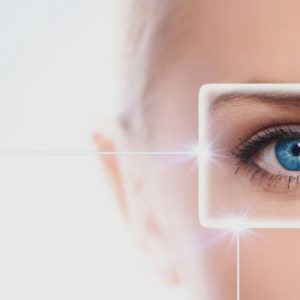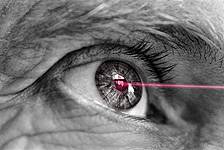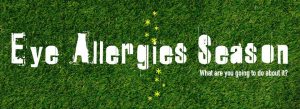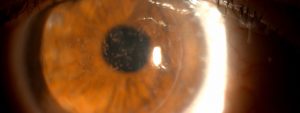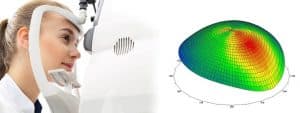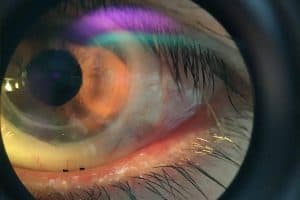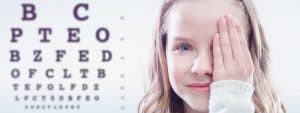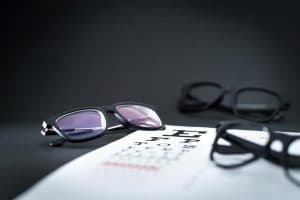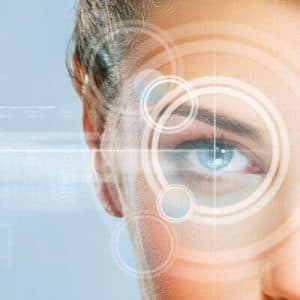Contact Lenses and Children: Part 2 Q&A
Did you know? Contact lenses can be safely worn by children aged 8 and up. Many times, parents are hesitant to get their child contact
Read MoreAllergies and Contact Lenses: Part 2 Q
Pollen is not the only cause of allergies that can affect your eyes and make wearing contact lenses uncomfortable. Dust, mold, smoke, and pet dander
Read MoreTop 8 Tips for Allergies and Contact Lenses
Do you suffer from allergies, but also want to wear contact lenses? Pollen is not the only cause of allergies that can affect your eyes
Read MoreEyes and Herpes: Q&A
Herpes eye infection requires urgent medical attention. Eye herpes, also known as herpes keratitis, is a viral infection of the eye caused by the herpes
Read MoreHow Does Herpes Affect the Eyes?
Eye herpes affects over 1.5 million people around the world each year. The most common type of eye herpes is called epithelial keratitis, which tends
Read MoreChildren’s Vision: FAQs
These are the 5 most frequent questions asked to eye doctors on children’s vision. You may easily find answers to your questions below. If you still have questions, contact your nearest eye doctor experienced in children’s vision.
Read MoreContact Lenses: Daily or Monthly?
An estimated 45 million people in the U.S. wear contact lenses. Contact lenses are a great choice for people who want convenience and clear vision.
Read MoreIs Sleeping in Contact Lenses Dangerous?
About one-third of contact lens wearers occasionally sleep with their lenses. It’s easy to fall asleep in your contact lenses; one minute you’re reading a
Read MoreTop 5 Myopia Myths
Do you want to know the truth about the top 5 myopia myths? Myopia affects 1.45 billion people worldwide and is the most common refractive
Read MoreTop 8 Contact Lens Problems
An estimated 45 million people in the U.S. wear contact lenses. If you are one of the millions that wears contact lenses, then you know
Read MoreMultifocal Contact Lenses for Children
Was your child prescribed multifocal contact lenses and you’re not sure why? Multifocal contact lenses are prescribed for children to support their learning and school
Read MoreShould I Buy Glasses Online?
While buying glasses and contact lenses online may seem enticing, there are many factors to think about before clicking that ‘buy’ button. Shopping online can seem to save time and money and can be extremely convenient, done from virtually anywhere at any time.
Read MoreGuide to Implantable Contact Lenses
Have you been told you cannot have laser eye surgery? ICLs may be the solution. If you are considering laser vision correction surgery, an implantable contact lens (ICL) could be an option to provide you with the best vision.
Read MoreLASIK Eye Surgery: 5 Myths and Facts
Here’s the most common myths and facts on laser eye surgery. While LASIK eye surgery has become the most popular refractive surgery in the U.S, there are many misconceptions regarding this procedure that prevent people from even discussing LASIK with their eye doctors.
Read MoreContact Lenses for Astigmatism
Approximately 1 in 3 people have astigmatism, a vision condition that causes blurry and distorted vision. If you have astigmatism, there is a wide variety
Read MoreTypes of Eye Allergies
Up to 25 percent of people worldwide suffer from eye allergies. If you suffer from eye allergies, you may be wondering what is causing your
Read MoreContact Lenses or Laser Eye Surgery?
Tired of wearing your glasses everyday? If you wear corrective lenses for nearsightedness, farsightedness or astigmatism, you may be wondering about the advantages that contact lenses and laser eye surgery have to offer. Contact lenses are a great solution if you would like to be free of your glasses, but laser eye surgery, also called laser refractive surgery, can help to eliminate the need for corrective eye wear altogether.
Read MoreBurning Eyes at Night
If your eyes are burning at night, you may be suffering from dry eye syndrome. Dry eye syndrome can put a damper on your day
Read MoreWho Can Benefit from Scleral Lenses?
If your regular contact lenses are causing you discomfort, ask your eye doctor about switching to scleral lenses. Scleral lenses are rigid gas permeable (RGP)
Read MoreContact Lenses for Giant Papillary Conjunctivitis (GPC)
Up to five percent of contact lens wearers will develop GPC in their lifetime. Giant papillary conjunctivitis (GPC) is an allergic reaction that causes small
Read MoreHow Does Ortho-K Work?
Ortho-k lenses are designed to float on top of the eye’s tear film and apply gentle water-based (hydraulic) pressure to the front layer of the cornea, called the epithelium. The hydraulic pressure causes the cells of the epithelium to move from the center of the cornea to the periphery. This migration of corneal cells leads to a temporary reshaping of the cornea and correction of the refractive error.
Read MoreOrtho-K: Top 10 FAQs
Orthokeratology (ortho-k) is quickly becoming the gold standard for myopia management in children. Here are the top 10 most frequently asked questions about ortho-k to help you decide if this myopia management technique is right for you.
Read MoreAre Ortho-K Lenses Safe?
Ortho-k lenses are designed to reshape your cornea while you sleep, so you can benefit from clear vision during the day— without the need for glasses or contact lenses. These specialized lenses are prescribed to control the rate of myopia progression in children, as well as for vision correction without the need for daytime eyewear. The question is, are they safe?
Read MoreEye Allergies and Contact Lenses
Eye allergies can cause a host of uncomfortable symptoms, making contact lens wear difficult for many allergy sufferers. Eye allergies can cause any of the
Read MoreTips for Allergic Eyes
Did you know that up to 25 percent of people suffer from eye allergies? Eye allergies can develop at any time during the year, and
Read MoreCorneal Transplant (Keratoplasty)
More than 44,000 corneal transplants are performed in the United States each year. The cornea is the outermost layer of the eye that is responsible
Read MoreAnswers to Your Top 6 Questions about COVID-19 and Your Eyes
With healthcare information changing daily amidst the COVID-19 pandemic, little attention has been given to the virus’ effect on one of the most sensitive parts
Read MoreCorneal Ulcers
What is a corneal ulcer? The cornea is the translucent, outermost layer of the eye that covers the pupil and iris. The cornea plays a
Read MoreCan Pregnancy Affect Vision?
Most moms-to-be are well aware of the bodily changes that remind you on a daily basis that you are expecting— the most common being: morning sickness, food aversions, heightened sense of smell, swollen ankles, headaches, exhaustion, and many other uncomfortable yet normal pregnancy symptoms. What you may not know is that these physiological changes that take place during pregnancy can also lead to changes in your eyes and vision.
Read MoreHow to Insert and Remove Scleral Lenses
New to scleral lenses? Here’s a beginner’s guide to inserting and removing scleral lenses. Scleral lenses are larger than the traditional hard or rigid gas
Read MoreHow to Insert and Remove Hard Contact Lenses
Below is a helpful guide on how to insert and remove your rigid gas permeable (RGP) lenses using the most common, easy to follow methods. This
Read MoreCommon Contact Lens Problems
While wearing contact lenses is a safe alternative to eyeglasses, they can come with problems that you may not expect— especially if you are a new contact lens wearer. Here are some of the most common contact lens problems, and how to avoid them.
Read MoreGuide to Scleral Lenses
Scleral lenses are a type of gas permeable (GP) lens that are specially designed for patients with corneal irregularities and other eye conditions that make contact lens wear difficult.
Read MoreThe Contact Lens Exam
Over 22 percent of people who wear eyeglasses enjoy the benefits of also using contact lenses. If you are thinking about contact lenses, a contact
Read MoreGuide to Hard Contact Lenses
While soft contact lenses have become quite popular in recent years, hard contact lenses are actually preferred by many people with specific vision conditions
Read MoreContact Lenses: What Can Go Wrong?
When it comes to eyewear, contact lenses offer many benefits. But contact lens use can also cause serious complications to your eye health and vision,
Read MoreGuide to Soft Contact Lenses
Approximately 90 percent of contact lens wearers prefer soft contact lenses. There are many different options when it comes to soft contact lenses. While your optometrist can help you to narrow down your choices— usually dependent on your prescription and personal lifestyle, it is important to be aware of the advantages and disadvantages of each type of lens
Read MoreHow to Insert and Remove Soft Contact Lenses
If you are a new contact wearer, you may be a bit nervous about inserting and removing your new lenses. While inserting and removing your
Read MoreThe Do’s and Don’ts of Wearing Contact Lenses
Wearing contact lenses has many advantages when compared to eyeglasses. However, since the lenses sit directly on your eyes, it is crucial to be aware
Read MoreWhat Is Corneal Topography?
Corneal topography, also known as corneal mapping, is a diagnostic tool that provides 3-D images of the cornea. The cornea is the outer layer of
Read MoreKeratoconus
What is keratoconus? Keratoconus is a progressive disease that causes thinning and reshaping of the cornea, the front part of your eye. In a healthy
Read MoreMyopia Management FAQs
Q1: What is myopia? A: Myopia is a refractive error, or a vision condition that affects the ability to see distant images or objects clearly.
Read MoreCorneal Dystrophies
Corneal conditions can permantly impact your vision. The cornea is the clear, protective outer layer of the eye. It’s primary function is to act as
Read MoreWhat Are Contact Lenses?
Contact lenses are designed to cover the cornea, the clear covering of the eye. They stay in place by adhering to the tear film of the eye, and through the pressure from the eyelids. When you blink, your eyelid glides over the contact lens, enabling a cleansing and lubricating action to keep the contact lens comfortable on the cornea.
Read MoreWhat is Myopia Management?
Myopia management has shown to decrease myopia progression by up to 78%. Myopia management is a treatment program to keep the level of myopia as low as possible, and reduce your risk of developing a serious sight-threatening eye disease. Myopia management can involve the use of eyeglasses, contact lenses, and eye drops— all scientifically proven to aid in the control of myopia progression.
Read MoreNatural Remedies for Dry Eyes
Wondering what you can do to relieve dry eyes… naturally? You may be wondering what you can do to naturally relieve your dry eye symptoms?
Read MoreWhat Is Dry Eye Syndrome?
Over 58% of the population suffer from dry eyes. Dry eyes is a common condition that results from insufficient tear quantity, or inadequate tear quality.
Read MoreWhat is Laser Refractive Surgery?
Are you thinking of having laser eye surgery? Laser eye surgery, also called laser refractive surgery, is a common procedure that is performed to eliminate the need for eye wear— both glasses and contact lenses. Up to 98 percent of patients achieve 20/20 vision with laser eye surgery.
Read MoreGuide to Bifocals and Multifocals
Have you noticed the need to hold your phone, books or restaurant menus farther from your eyes to improve their clarity? Presbyopia is the most common reason most adults begin to wear eyeglasses. The condition generally develops overtime, beginning at around age 40, and is considered a normal part of the aging process.
Read MoreGuide to Sunglasses
Sunglasses are fashionable, but why are they so important? Most people are aware of the harmful effects ultraviolet (UV) radiation can have on the skin. However, many are unaware that UV radiation can also endanger our ocular health and vision.
Read MorePurchasing Contact Lenses Online?
Purchasing contact lenses from an online supplier is tempting, but may end up costing you more in the long run. The latest trend in purchasing contact lenses involves ordering from online retail suppliers. While it may seem appealing to have your contact lenses shipped straight to your door, unfortunately, there are many disadvantages to purchasing contact lenses online
Read MoreOptical Frames
Shopping for eyeglass frames can be quite overwhelming… but also lots of fun! Eyeglasses nowadays come in a variety of styles, shapes, colors, and materials— metal, plastic, and even natural wood. Optical stores are filled with rows and rows of frames, manufactured by popular brands and designers to suit every taste and unique fashion sense.
Read MoreConjunctivitis and Eye Infections
Eye infections can cause redness, pain and inflammation, and can even lead to permanent vision loss if not treated effectively. Approximately 1 in 300 people
Read MoreHow to Prevent Eye Allergies
If you suffer from red, sore allergic eyes, there are several ways to prevent this condition from affecting your life. Allergies are a common complaint,
Read MoreEyecare for Children
Eyecare for Children Are you worried about your child needing glasses? Do you want to understand why your child needs bifocals or multifocals? Are you
Read MoreThe Myth of 20/20 Vision
Have you been told that your child has ‘perfect 20/20 vision’, but is still not reaching their potential at school?
A child can have 20/20 sight, and still have one or more vision problems affecting their school grades The term ’20/20 vision’ only means your child has clear distance sight, but they may still have lazy eye, eye tracking, eye focusing or visual information processing issues.
Vision for Special Needs
Children with special needs have a high rate of visual problems and their lives can be enhanced with the correct eye care. Vision therapy has also been shown to improve the visual skills to improve eye contact and interactions with their surroundings – significantly enhancing their lives.
Read MoreChildren’s Vision
Home > Children’s Vision Children’s Vision Would you like to understand the importance of a pediatric eye exam? Would you like to know how to
Read MoreWhy Is My Child’s Myopia Worsening?
Are you concerned that your child needs stronger eyeglasses? Myopia is not only blurry vision but can also lead to serious sight-threatening eye diseases. Myopia
Read MoreWhat is Presbyopia?
What is presbyopia? Presbyopia is the most common reason most adults begin to wear eyeglasses. Presbyopia gradually develops overtime, beginning at around age 40— it
Read MoreWhat Is Farsightedness?
It is estimated that 13% of school age children are far-sighted, farsightedness, also known as long-sightedness or hyperopia, causes near objects or images to appear blurry. Hyperopia causes the eye to focus what you are looking at behind the retina, instead of on the retina- causing words on a page, or images on your phone to appear out of focus.
Read MoreDo Children Need Sunglasses?
We all appreciate the need to protect our skin and eyes from harmful ultraviolet (UV) radiation— this is even more important for children! Your child’s
Read MoreCan Children Wear Contact Lenses?
Eye doctors report that over 4 in 10 of their contact lens patients are school aged. According to the American Optometric Association (AOA), approximately 45 million people in the US wear contact lenses and 14.5 percent of all children under 17 years wear contact lenses.
Read MoreWhat Is Astigmatism?
Astigmatism is one of the most misunderstood optical terms…maybe because it is so hard to say?! Astigmatism is a refractive error that causes distorted vision, usually at all distances. It is a common vision condition that can be present at birth, or develop over time, and most frequently occurs together with myopia (nearsightedness) or hyperopia (farsightedness).
Read MoreA Guide to Eye Infections
Up to 1 in 8 of all children will have an eye infection each year. Parents should be aware of the symptoms of an eye infection to enable prompt identification and treatment. Eye infections can be serious and may cause permanent vision loss. Effective treatment is always needed, especially when bacteria, viruses, or fungi invade the eye or the surrounding areas. The most common eye infections that affect children are called Viral and Bacterial Conjunctivitis— both highly contagious.
Read MoreWhat Is Myopia?
Myopia affects clarity of vision for any distant images and objects – the board in a classroom, driving, the television, a clock on the wall, etc. Myopia affects millions of children and adults, worldwide, over 30% of the U.S. population suffers from myopia.
Read MoreWhy Is Myopia Management Important?
Is there a way to prevent my child’s myopia from worsening? A number of recent studies suggest that it may be possible to control myopia by totally stopping, or at least slowing down, its progression during childhood and teenage years. Myopia management is a treatment program aimed at controlling myopia, keeping the level of myopia as low as possible, in order to reduce your child’s risk of developing vision threatening eye diseases later in life.
Read MoreChoosing Glasses for Children
A guide to choosing the best eyeglasses for your child. Eyeglasses for children are now fun, colorful, and available in a wide variety of shapes and sizes. The latest children’s frames are also durable enough to survive the rough and tumble play of today’s child. With so many appealing choices, walking into an optical store can be quite overwhelming … remember to keep this experience as fun and relaxed as possible!
Read More










